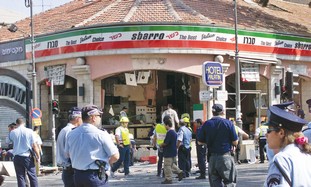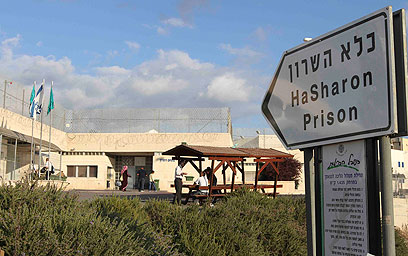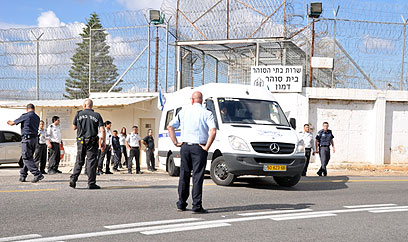Melanie Lidman; Jerusalem Post staff
Terror Victims Divided over Schalit Prisoner Swap
Almagor: We’re sending a message to terrorists to continue to kill Jews; infrastructures minister calls deal “victory for terror.”
The Jerusalem Post
2011-10-14
Source

Sbarro Terror Attack in Jerusalem Photo: REUTERS
In a sea of ecstatic supporters dancing and singing outside the Schalit family tent at midnight on Tuesday night, a somber Lea Schijveschuurder stood across the street to remind the masses that Gilad Schalit’s release comes at a heavy price.
Across from the tent, she held a sign that read, “The blood of my parents is screaming in their grave.” Schijveschuurder’s parents and three siblings were murdered in the terrorist attack at Sbarro in August 2001.
“Do they want them to kill more people?” a tearful Schijveschuurder asked as she stood opposite the Schalit tent and fended off arguments from Schalit supporters. “For me, enough people have died.”
While it is still unclear if the terrorists involved with the Sbarro attack will be on the list of 1,027 prisoners to be released, the Israeli public will grapple with Schijveschuurder’s difficult question as preparations to bring Schalit home begin.
“There will be a public argument – there will be an argument between one pain and another pain,” said Shimshon Liebman, the head of the Campaign to Free Gilad Schalit, early Wednesday morning as the crowds began to thin out.
“We need to be courageous to pay a price and to stay strong. One of our soldiers is worth much more than theirs are. We’ll survive the appeals because at the end of the day the Jewish morals are stronger than anything else for the people of Israel,” he said.
The head of the Almagor Terror Victims Association, Meir Indor, slammed the prisoner swap deal. “The Schalit family wins and the state loses,” he said. “It’s a victory for terror and Hamas. We know from our experience that hundreds of people will pay with future terrorist attacks, and that they’ll organize more kidnappings.”
According to Almagor, since 2004, 183 Israelis have been killed in terror attacks carried out by terrorists who were released from prison.
“How many will be killed for Schalit?” he asked, before heading into a marathon of meetings to prepare appeals to the High Court of Justice.
Indor accused Prime Minister Binyamin Netanyahu of giving into popular pressure, and trying to take away the focus from the social protests from the summer, despite denouncing the practice of prisoner exchanges during his political career and in his book.
He denounced the government for sending a clear message to terrorists: “Go ahead and do terror. Continue to kill Jews. There’s no justice and no paying for it. It’s a revolving door and the system of terror is working in Israel.”
Shalom Rahum, father of terror victim Ofir Rahum, condemned on Wednesday the freeing of his son’s murderer as part of the Israel-Hamas prisoner exchange that will see the release of Gilad Schalit, according to Army Radio.
Amna Mouna, Ofir’s killer, will be freed and sent abroad.
“We’re talking about scum of the earth that will go back to terror,” Shalom said. “Even an appeal to the High Court won’t help.”
But many terror victims supported the deal.
Kay Wilson, who survived a terror attack last December which killed her friend Christine Luken, said she cried with happiness when she heard that Gilad Schalit was coming home. The trial of the terrorists who stabbed Luken to death and severely wounded Wilson just started last month, so it is highly unlikely that they will be included in the prisoner swap, because they have not yet been sentenced.
Wilson said despite her support of the prisoner swap, she had “very mixed feelings” if the men who had perpetrated the terror attack were eventually released.
“I would feel that the country has done me a personal injustice,” she said on Wednesday.
“On the other hand, there’s justice for another family. It’s the stupid dilemma we live with.”
“Emotionally, it’s healthier to celebrate life, rather than to get stuck with loss,” Wilson said.
“Death is horrible, but there’s something very redeeming about returning one of our own.”
She added that as a survivor, she had a different perspective from people like Schijveschuurder, who had lost multiple family members. Still, Wilson disagreed with the idea that the country must weigh who is in more pain, the Schalit family or the victims of terror.
“I don’t think you can ever compare pain because everyone’s experience is subjective,” she said. “On the other hand, if you experience death, it’s ghastly, but there is a closure.
It’s agony of waiting and nonclosure and not knowing [of the Schalit family] that’s almost more horrendous because they can’t get on with their life.”
Wilson said the thought of eventually releasing terrorists who perpetrated the attack against her in a future swap had plagued her since the news broke, but that she still supports Aviva and Noam Schalit.
“Of course that’s a huge fear [of their eventual release],” she said. “But I don’t think that if they weren’t released, we could have stopped terrorism anyways. It’s like cutting the grass – you can get rid of some, but it keeps growing back. It’s not like if you keep these people in prison there’s not going to be terrorism; they’re breeding terrorists through poverty and lack of education, and it’s a much more complex problem.”





